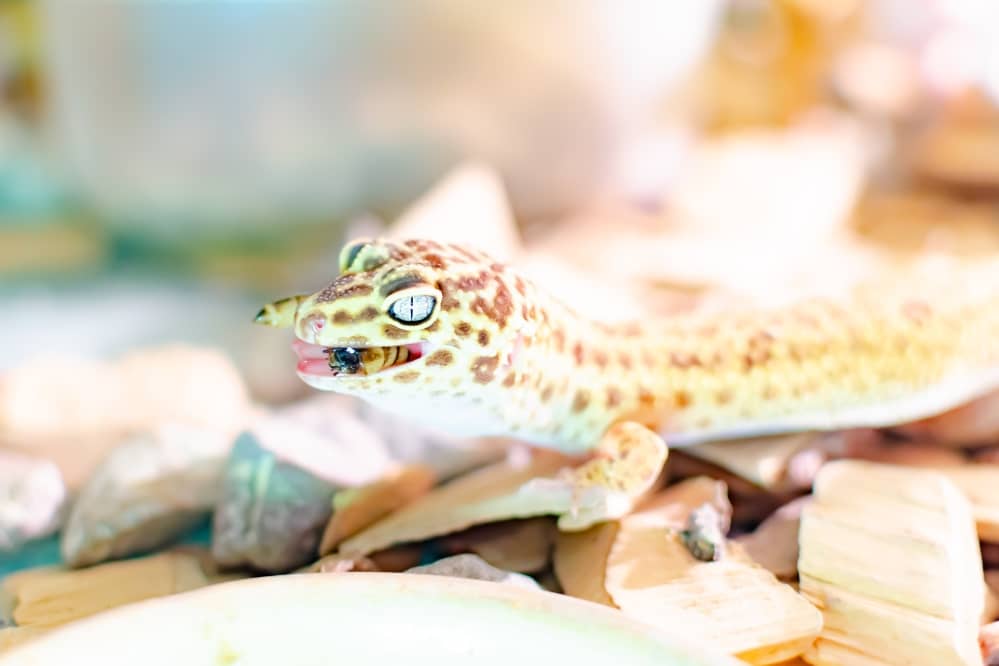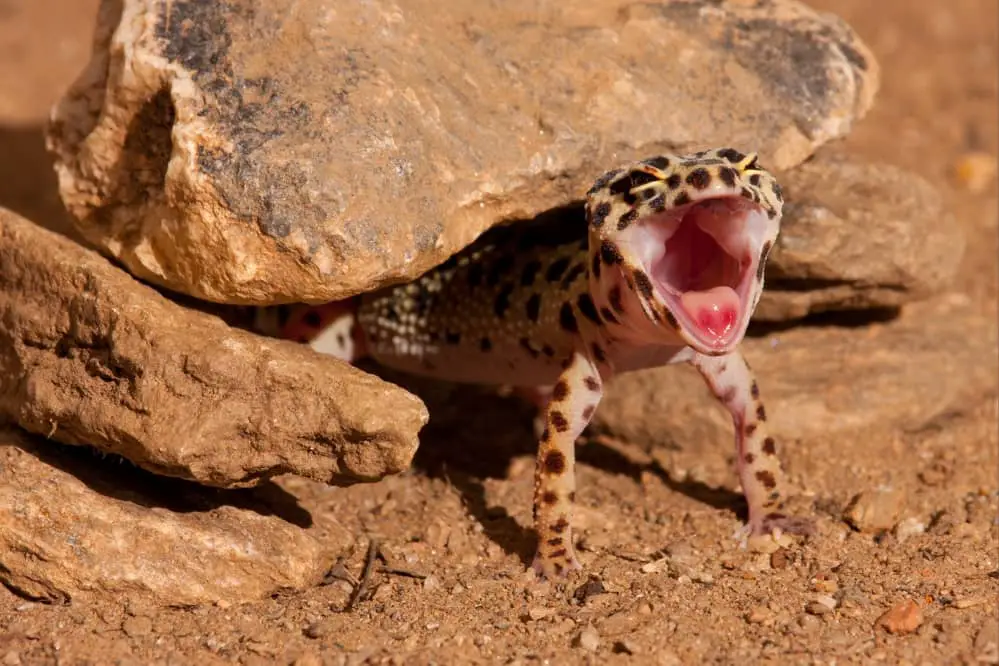Do Leopard Geckos Have Teeth? is one of the most often asked questions regarding leopard geckos. Leopard Geckos do indeed possess teeth. Leopard geckos have 100 permanent teeth that they will continue to replace until they die. They utilize their fangs to capture prey and defend themselves. Despite having highly keen teeth, leopard geckos rarely bite their keepers.
Do Leopard Geckos Have Teeth?
Each leopard gecko species has teeth, but their shape, size, and quantity vary. Geckos often have an average of 100 teeth in their mouths. Yes, you read it correctly! This little critter has approximately 100 teeth. They are polyphyodonty, meaning that their teeth are regularly replaced.
Every three to four months, geckos replace their teeth entirely. In contrast to humans, who replace their baby teeth with permanent teeth only once in their lives, other animals, such as geckos, might lose their teeth every few months. Leopard Geckos have completely developed teeth from birth. Most geckos have rows of small, conical teeth with sharply converging sides on both jaws. The lower jaw often has fewer teeth than the upper jaw.
What kind of teeth does a leopard gecko acquire?
The leopard gecko has polyphyodont teeth. This indicates that their teeth are continuously replaced when one or more are lost. Every three to four months, their teeth undergo this metamorphosis.
They also possess pleurodont teeth, which explains how they can replace their teeth despite reaching adulthood. A leopard gecko’s pleurodont teeth have longer roots than acrodont teeth and are connected to the inner side of the jawbone.
The roots of acrodont teeth are shorter and cannot be replaced after the animal reaches maturity. Upon closer inspection, you will notice that a leopard gecko’s teeth resemble ours. In addition, enamel covers the dentin. The roots then bind the tooth to the jawbone.
The sole distinction is that they have three times as many teeth as we have. In addition, their teeth are highly specialized for capturing and retaining prey.
Are the teeth of leopard geckos sharp?
Yes. They possess highly pointed conical teeth. Their teeth are nearly identical in size and shape from the front to the back of the jaw. They do not require specialized teeth like humans and have the same type of tooth throughout their entire mouth.
Are Teeth Present in Baby Leopard Geckos?
The teeth of leopard gecko hatchlings are complete. You do not notice because they are too small. Despite their small size, they are as sharp. You have observed how small the teeth of an adult leopard gecko are. Imagine that on a more diminutive form of the animal. It isn’t easy to see. However, young leopard geckos have teeth.
Can You Get Bitten by a Leopard Gecko?
Before acquiring a pet, pet owners usually consider the potential health risks to the animal and themselves. Allergies, health conditions, and odd symptoms can have negative consequences. Additionally, you must ensure that your pet is harmless and will not endanger you or your children.
Many reptiles have formidable teeth, causing pet owners to fear keeping a gecko as a pet. If Leopard Geckos have teeth, do they also bite?
Yes, Leopard geckos can bite. However, the likelihood of being bitten by a Leopard gecko is low; they only bite when they are overly anxious, agitated, or threatened.
These nocturnal creatures are not poisonous and will only bite if provoked or assaulted. They are simple to care for and docile, making them great pets for beginners. However, all animals will defend themselves when attacked or disturbed.
What causes geckos to bite?
Highly territorial
Male leopard geckos are pretty territorial, meaning they prefer their own space. It is preferable to house only one male gecko in each tank. The odor of another male gecko is a potent trigger for them. If you do not thoroughly remove the gecko fragrance from your hands before handling multiple male geckos, they may confuse the aroma on your hands for that of another male gecko and bite you.
Hunger Can Make Them Aggressive

They may confuse your fingertips for food when they are hungry. If you pick them up before feeding them, they may mistake your fingers for food and bite them. Although leopard geckos may survive without food for 10 to 14 days, you should not capture them if they have not been eaten in days.
Afraid or Angered
All animals enter a protective posture when frightened, agitated, or stressed. If leopard geckos feel you to be a threat, it is typical for them to bite. Any new setting or owner can cause your pet anxiety, resulting in agitation or aggression. Over stress may also result in the loss of a gecko’s tail. Adult geckos are less aggressive than juveniles. As they age, they become domesticated. If you over handle your gecko, it may become overstressed and bite the handler.
Do Geckos Bite Hurt?
No, it won’t hurt you. Due to the small size of their teeth, Leopard gecko bites feel like a light squeeze and do not even penetrate human skin. You may not even feel or bleed from its bite. They rarely pierce the skin; if they do, it’s a minor wound and nothing dangerous! However, the bite will be somewhat painful if the leopard gecko morph is a Giant Leopard Gecko
How to Respond if a Leopard Gecko Bites You
These calm lizards can bite if provoked but are otherwise harmless pets. They are small, nonvenomous critters with tiny teeth; even if they bite you, it will only result in a minor scratch.
Their teeth are not aligned properly, and they do not use them to chew. Instead, they utilize muscle contractions and a flexible tongue to swallow the bug. Their teeth facilitate the entire process.
However, Leopard gecko bites can occasionally transmit disease. In most cases, all animals have bacteria or germs in their saliva. It is preferable to constantly take precautions and wash your hands after dealing with your pet. Pet leopard geckos are safe. However, an exposed cut may become infected. It is advisable to consult a physician if you observe any signs of infection.
How Dangerous Are Leopard Gecko Bites?
As previously stated, Leopard Geckos are harmless, and their bite does not cause injury. However, if you attempt to yank a gecko off your skin with excessive force, it will attempt to grip on more tenaciously, resulting in a minor scratch and, in rare circumstances, blood.
As many reptiles carry salmonella bacteria, which can be transmitted through their bites, their bites can sometimes cause infection. It would help if you washed your hands with antibacterial soap or disinfectant as soon as possible. Alcohol or hydrogen peroxide applied to a wound might also hasten its recovery.
Conclusion
Leopard Gecko teeth are present. There are approximately 100 of them. Though their teeth are essential to their survival because they let them hold and crush prey, they do not bite their owners, and if they do, it just feels like a squeeze. They are nonvenomous reptiles whose bites do not cause serious injury to humans. Their nonpoisonous, gentle, and low-maintenance character makes them the most popular pet gecko.

